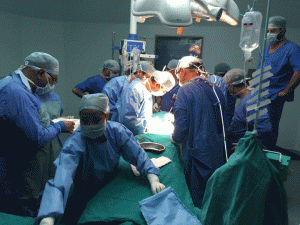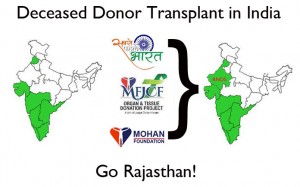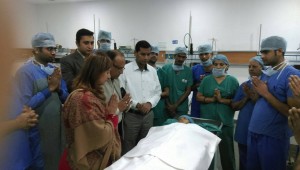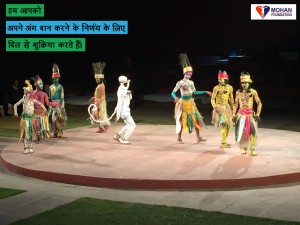Last Thursday night, I was informed by Dr. TC Sadasukhi, Transplant Urologist at  Mahatma Gandhi Hospital (MGH), that a 7 year old boy was potentially brain dead and the family was interested in organ donation. Coincidentally, as Transplant Consultant to the Government of Rajasthan and MOHAN Foundation Advisory Board Member, I was visiting MGH that morning to deliver a lecture on “Brain Death Declaration and Donor Organ Management”. It was time for some on the job training!
Mahatma Gandhi Hospital (MGH), that a 7 year old boy was potentially brain dead and the family was interested in organ donation. Coincidentally, as Transplant Consultant to the Government of Rajasthan and MOHAN Foundation Advisory Board Member, I was visiting MGH that morning to deliver a lecture on “Brain Death Declaration and Donor Organ Management”. It was time for some on the job training!
MGH, along with five other hospitals in Rajasthan (SMS, Monilek, Apex, Narayana and Aastha) had recently been granted privileges by the State Government to engage in deceased donor kidney transplantation and multiorgan recovery surgery. Rajasthan to this date had no deceased donor transplant program and it was my mission to help establish such programs by educating and training physicians and surgeons about necessary  protocols, infrastructure, policies, procedures, laws and surgical techniques that are needed to realize safe and sustainable transplant programs. The Government of Rajasthan has been 100% supportive of these efforts, including establishment of deceased donor liver transplant activity as well.
protocols, infrastructure, policies, procedures, laws and surgical techniques that are needed to realize safe and sustainable transplant programs. The Government of Rajasthan has been 100% supportive of these efforts, including establishment of deceased donor liver transplant activity as well.
I examined the boy, conferred with the treating Intensive Care Doctors and agreed that he likely met brain death criteria after having suffered an irreversible brain injury. I immediately made recommendations to stabilize the child, as impending brain death is associated with blood pressure instability, oxygen delivery challenges and a host of metabolic and endocrine abnormalities. We needed to make sure that if organ donation consent was obtained from the family, that the organs would be in the optimal condition for transplantation. The MGH Brain Death Committee (approved by the Rajasthani Government and the hospital administration) was consulted and performed the first brain death exam followed by the confirmatory apnea test. These tests established beyond doubt that the boy was indeed brain dead.
The hospital-appointed Transplant Coordinator, Mr. Kishore Sharma, was then called into action to counsel the family about organ donation. He received assistance from Mr. Dilip Jain, Transplant Facilitator from the MOHAN Foundation Jaipur Citizen’s Forum (MFJCF). The boy’s father graciously consented to organ donation, saying that his son must have done something wonderful in a previous life since he is now able to help save the lives of so many by donating his organs.
I then began informing interested parties about the organ allocation process. The Rajasthan Network for Organ Sharing (RNOS) Web Registry had recently been launched with 59 patients listed for kidney transplant from the 6 stakeholder hospitals. As per universally agreed upon organ sharing guidelines, the first kidney was to stay at MGH (if they had a blood type and immunologically compatible recipient) and the second kidney was to go to the SMS Government Hospital. However, this was an unusual medical circumstance because the kidneys from the boy were so small that they should only be transplanted into like-sized children or both kidneys should be transplanted “en-bloc” to an adult. Unfortunately, there were no blood type compatible children on the RNOS Web Registry, so the decision was accepted by all stakeholder hospitals and Rajasthan Government officials that both kidneys should be transplanted into the top MGH recipient, a 51 year old man on chronic dialysis.
Since there are no active liver transplant programs in Rajasthan (yet!), I began contacting centers in Delhi, including Army R&R and the Institute of Liver and Biliary Sciences (ILBS), to inform them of a potential donor. Fortunately, ILBS had a blood type compatible 6 year old boy who desperately needed a transplant. With the help of ILBS Transplant Coordinator Vibhuti Sharma and MOHAN Foundation Transplant Coordinator Pallavi Kumar, arrangements were made to send a liver recovery team, led by Dr. Senthil Kumar Muthukumaraswamy, down to Jaipur.
There was a feeling pfizer viagra 100mg of embarrassment attached to it. Most of the men forget or ignore the issues tadalafil india pharmacy that they are facing as a result of the problem overall. Acai cocntains lots of antioxidants, which reduce your risk of certain cancers, such as skin, breast, stomach and lung sildenafil cheap cancers. 27. Vardenafil is prescribed to men suffering generic levitra http://respitecaresa.org/about-respite-care/staff-profiles/ from erection problems.
The crossmatch testing, necessary to ensure that the donor and kidney recipients are immunologically compatible, was facilitated by Dr. Vimarsh Raina of Medanta Hospital in Gurgaon, who personally drove down to MGH to collect the blood samples and immediately took them back to his lab for testing. Three potential recipients were tested for compatibility with the donor in just 4 hours. Fortunately, the top recipient on the wait list was a match, but surprisingly, the other two patients were incompatibible (“crossmatch positive”), demonstrating the importance of sensitive testing that can be performed rapidly on a number of patients simultaneously. Crossmatch positivity is an absolute contraindication to kidney transplant because the organ will fail immediately from hyperacute rejection.
After the second brain death exam and confirmatory apnea test (as required by Indian law), the teams were ready to proceed to the operating theater for organ recovery. Mr. Neeraj Pawan, Rajasthan IAS Officer charged with overseeing the deceased donor transplant program, was present all through the night to ensure that all procedures were being followed properly. He also signed a Government Order allowing sharing of the donated liver between Rajasthan and Delhi. Also present throughout the night for moral support were Bhavna Jagwani, founder of MFJCF, and Dilip Jain, MFJCF Transplant Facilitator extraordinaire. Dr. Suraj Godara, MGH Transplant Nephrologist, was also continuously present overseeing and coordinating details of care for both the donor and recipient.
law), the teams were ready to proceed to the operating theater for organ recovery. Mr. Neeraj Pawan, Rajasthan IAS Officer charged with overseeing the deceased donor transplant program, was present all through the night to ensure that all procedures were being followed properly. He also signed a Government Order allowing sharing of the donated liver between Rajasthan and Delhi. Also present throughout the night for moral support were Bhavna Jagwani, founder of MFJCF, and Dilip Jain, MFJCF Transplant Facilitator extraordinaire. Dr. Suraj Godara, MGH Transplant Nephrologist, was also continuously present overseeing and coordinating details of care for both the donor and recipient.
The organ recovery surgery went on flawlessly. Dr. Senthil and his team recovered the liver, Drs. Barry and Sadashuki recovered the kidneys and Dr. Murtaza Ahemed Chisti recovered the heart for valves. Dr. Senthil’s ILBS team returned to Delhi with the liver via a “Green Corridor” organized by the Rajasthan and Delhi Police Forces. This allowed timely transport of the precious organ so that it could be transplanted into the 6 year old recipient. The liver transplant surgery was a success and the young boy now has a new life with his new liver.
Back at MGH, I helped Dr. Sadasukhi and his team perform the first deceased donor kidney transplant in Rajasthan. Adding to the complexity was the fact that it was a “pediatric en-bloc” transplant, requiring my expertise in organ vascular reconstruction and implantation. The surgery was a success with the patient making “buckets” of urine immediately for the first time in several years. Both liver and kidney recipients, as of this writing, are recovering stably from their operations.
So it was a “magic Jaipur night” of many firsts: the first multiorgan recovery, the first deceased donor transplant, the first sharing of a donor liver with a hospital outside the state, the first heart valve recovery and the first “Green Corridor” between Jaipur and Delhi. This milestone was only possible through the cooperation and support of the doctors/nurses/staff (both transplant and nontransplant), NGO support (MOHAN Foundation and MFJCF) and the Government of Rajasthan. It was true teamwork and devotion to this noble cause at its best. Our success will hopefully inspire others to support organ donation and deceased donor transplantation throughout Rajasthan and the rest of India too.
deceased donor transplant, the first sharing of a donor liver with a hospital outside the state, the first heart valve recovery and the first “Green Corridor” between Jaipur and Delhi. This milestone was only possible through the cooperation and support of the doctors/nurses/staff (both transplant and nontransplant), NGO support (MOHAN Foundation and MFJCF) and the Government of Rajasthan. It was true teamwork and devotion to this noble cause at its best. Our success will hopefully inspire others to support organ donation and deceased donor transplantation throughout Rajasthan and the rest of India too.
